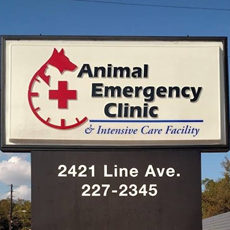Library
-
Papillomas are benign, sometimes multiple, tumors caused by viruses. They are commonly known as warts. The virus is transmitted through direct contact from an infected pet or the pet’s environment (e.g., toys, food bowls, or bedding) and gain access to the body when the skin becomes softened by moisture, through cuts and abrasions, or with the assistance of insects. Pets with immature immune systems such as young dogs and puppies, and those that are immune compromised, are more prone to developing papilloma tumors. The tumors often disappear within 1-2 months because the animal slowly develops an immunity to them. However, sometimes they persist, and surgical removal is necessary.
-
Parathyroid tumors are uncommon in dogs and cats. Benign adenomas occur more often than malignant tumors. Keeshonds appear to have a genetic predisposition to developing parathyroid tumors, but no breed or genetic relationship has been established in cats. Pets may exhibit signs of lethargy, little or no appetite, vomiting, and muscle twitching. Diagnosis is confirmed with PTH testing and ultrasound of the neck region after hypercalcemia is observed on bloodwork. Surgery to remove the affected gland(s) is the typical treatment, but ultrasound-guided ablation may be pursued. Careful monitoring of calcium levels post-surgery is important, as some pets may develop transient hypocalcemia and require calcium supplementation. Prognosis is excellent, and the metastatic rate for these tumors is extremely low.
-
Paroxetine is given by mouth and is used off label to treat certain behavior disorders such as aggression, anxiety, and urine-marking. Give as directed by your veterinarian. Common side effects include sleepiness and decreased appetite. Do not use in pets that are allergic to it or other SSRIs, or pets currently taking MAOIs. If a negative reaction occurs, please call your veterinary office.
-
Patent ductus arteriosus (PDA) is a heart defect that occurs when the ductus arteriosus (an opening between the aorta and the pulmonary artery) fails to close at birth. A PDA is usually diagnosed when your veterinarian hears a continuous heart murmur during a routine physical examination of your puppy. This article explains PDA and discusses signs, treatment, and prognosis for this condition.
-
Penetrating wounds can look minor on the surface but may cause severe injury below the skin. A thorough assessment requires sedation or anesthesia and surgery may be required to address the extent of the injury. This handout outlines first aid steps a pet owner can take while transporting their injured pet to the veterinary hospital.
-
Penicillin G (brand names VetriPen G, PenOne Pro, others), is an antibiotic used to treat susceptible infections in cats, dogs, chickens, horses, livestock, ferrets, hedgehogs, rabbits, and other animals. It is used off label (extra label) in cats, dogs, and other companion animals. Penicillin G comes in injectable suspension form. Caution when using in rabbits and other animals sensitive to penicillin-like drugs.
-
A Penrose drain is a latex tube placed into a wound with one or two ends exiting the skin to passively remove unwanted fluid, usually from abscesses or open wounds. This handout provides post-operative wound care instructions for cats sent home with a Penrose drain.
-
Pentosan polysulfate sodium is an injectable disease-modifying osteoarthritis drug (DMOAD) used to treat non-infectious and traumatic arthritis in dogs. It is also used off-label in cats. Follow your veterinarian’s instructions on how to administer the injection and dispose of the needle and syringe appropriately. Side effects are rare when given according to label recommendations and at prescribed intervals. Do not use in pets with a known hypersensitivity to it, in pets with known or suspected bleeding disorders or immune-mediated arthritis, or in pets with severe kidney or liver disorders.
-
Pentoxifylline is given by mouth and is used off label to treat skin disorders and poor perfusion due to inflamed blood vessels. Give as directed. Common side effects include vomiting, diarrhea, lack of appetite, excitement, or restlessness. Do not use in pets that are allergic to it, allergic to xanthines, or in pets with bleeding in the brain or eye. If a negative reaction occurs, please call your veterinary office.
-
Pericardial effusion refers to the abnormal accumulation of fluid in the sac surrounding the heart. Pericardial effusion can have a number of underlying causes, including inflammation, infection, cancer, and hereditary defects. Mild cases of pericardial effusion may be asymptomatic, but more significant fluid accumulations can interfere with the heart’s function and lead to severe effects such as sudden death. Treatment and prognosis is dependent upon the underlying cause of the condition.




